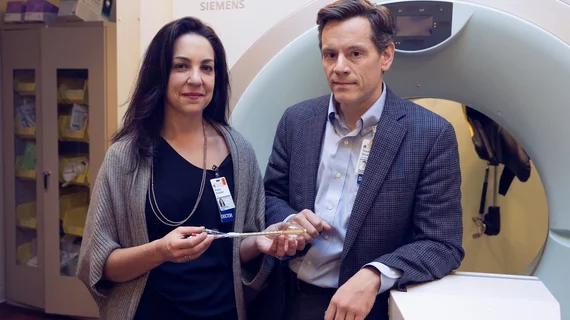NIH awards $1.8M to husband-and-wife duo to evaluate advanced breast radiation therapy technique
A husband-and-wife research team at the University of Virginia (UVA) Cancer Center, in Charlottesville was awarded a five-year, $1.8 million grant from the National Institutes of Health (NIH) to improve their advanced radiation therapy technique for early-stage breast cancer patients, according to a UVA press release published Nov. 15.
Since 2014, Timothy Showalter, MD, a radiation oncologist, and Shayna L. Showalter, MD, a breast cancer surgeon, have been developing a breast radiation technique called Prevision Breast intraoperative radiation therapy, or IORT. The technique uses advanced, image-guided brachytherapy and is claimed to be a more targeted, personalized and effective approach than conventional breast IORT.
“The clinical trial of Precision Breast IORT has been very well-received in the region, with rapid patient enrollment, and the entire team is to thank for that,” Shayna Showalter said in the statement. “It is so rewarding to be able to advance the field through such a patient-centered research program.”
Conventional IORT reduces weeks of radiation treatments for patients, giving just a single dose at the time of breast-preserving surgery. On the other hand, the Showalter’s Precision Breast IORT technique adds advanced CT imaging guidance to conventional radiation therapy and can double the dose given to patients.
With the NIH grant, the Showalters plan to evaluate Precision Breast IORT regarding five-year breast cancer recurrence rates, whether it can improve immune system effects, cost effectiveness and how these outcomes compare with existing radiation techniques.
“Our research will address fundamental questions about the impact of radiation therapy on the immune system for cancer patients,” Tim Showalter said. “We will also provide evidence needed to understand how Precision Breast IORT compares to other radiation options – an important foundation for disseminating our findings.”

